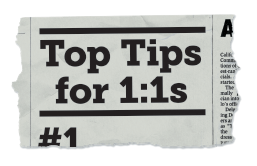Make Connections and Inspire Your Team
Learning Objectives
After completing this unit you’ll be able to:
- Use top tips to conduct successful one-on-one Meetings.
- Inspire your direct reports to lead your one-on-one Meetings.
Top Tips for Amazing One-on-One Meetings
If you’re thinking, “Cool, now I know the elements of a great 1:1, but I’d like some actionable tips,” we’ve got you covered. These tips will help you and your direct reports hold 1:1s that bring the four elements to life.

Let’s take a quick look at the Salesforce Top Tips for 1:1s:
- Meet regularly
- Inspire your direct reports to lead the meeting
- Start with real talk
- Be present
- Listen
- Align and prioritize
- Set expectations and prepare in advance
- Share feedback
- Provide support
- Follow up
First we’ll talk about the tips that help you connect with and inspire your team. In the next unit we’ll share top tips for aligning, providing feedback, and more.
Meet Regularly
We know your schedule is packed with more meetings and work than you can handle. But carving out and keeping 30- to 60-minute blocks in your calendar should be as nonnegotiable and sacred as having your morning coffee or tea.

“I promise my direct reports that we’ll meet every week. There’s never a week that I don’t hold 1:1s.” —Meghan Gendelman, Senior Director, Executive Marketing & Communications, Salesforce
We know sometimes life just happens and you need to move things around. No problem! Just make sure to reschedule the meeting. Doing so maintains the trust you’ve built and sense of importance around the meeting.
Inspire Your Direct Reports to Lead the Meeting
As a manager, one of your most important responsibilities is supporting your direct reports’ career growth. One way to do this is to let them lead the 1:1s. That includes creating the agenda and sharing it in advance of your meeting via email, Quip, or any other collaborative tool. This gives you a sense of what’s on their minds, and it gives your direct reports an opportunity to work on communication, planning, and prioritization. No matter where they want to go in their career growth, these skills are vital for being effective in any role.
That being said, it’s a good idea to give your direct reports guidance. Share tips about what you do to prepare for 1:1s with your direct reports.

"1:1s should be fun and inspiring!" —Simon Macklin, RVP Customer Success, EMEA
Start with Real Talk
Think about conversations you have with your friends or family—no matter what the topic, you probably start the conversation with a warm hello, or “How’s your day going?” The same should be true about your 1:1s.

“The first thing I do in my 1:1s is ask my direct reports something about how they’re doing. I’m genuinely interested and care about everyone on my team. I used to end my 1:1s on that personal note, but I’ve flipped it to the beginning because it’s so important.” —Meghan Gendelman, Senior Director, Executive Marketing & Communications, Salesforce
We know you might be tempted to jump right into business, but instead, be personable and start with real talk! Ask about your direct reports’ day, weekend, family, interests. Check in on their well-being and genuinely listen.
Start by asking something like:
- How are you doing?
- How’s your day going?
- What’s new?
- Did you watch _____ (sports event, awards show, or the season premier of a popular show)?
- What do you think of that bake sale fundraiser going on in the lobby?
If you want to keep the conversation going and learn even more about your direct reports, you can ask:
- What energizes you?
- Who inspires you?
- Whose opinion do you respect?
- Who do you like (or don't you like) working with?
You may find that you have a thing or two in common with your direct reports. And oftentimes, the answers to these questions can segue into the 1:1 agenda topics.
Be Present
What does it mean to be present? For sure it’s more than just being in a conference room or on a screen. It’s about having both brain and body ready and willing with your full attention.

“Never miss a 1:1. They’re a top priority.” —Cyril Treacy, Vice President Solution Engineering, Salesforce
It’s not always easy, we know. Here are some things you can do to make sure that you’re fully present during your 1:1s:
- Take a quiet moment of reflection or mindfulness to focus before entering the room or joining a virtual meeting.
- Arrive on time, and for sure, send a message if you’re running late.
- Remove distractions like your email and cell phone—turn them off or mute them.
- Make eye contact in person and use your webcam when meeting virtually.
- Listen and be prepared to offer guidance and support.
- Ask thoughtful, relevant questions in response to the topic at hand.
Listen
Speaking of being present, a big part of that is listening. And listening to understand, not just to reply.

“As a leader, you want to listen–a lot. Actively listen to what your employees are saying and what they’re not saying.” —Srinivas Tallapragada, President, Technology, Salesforce
Listening may seem simple, but how many times have you sat in a meeting only to realize later that you missed something important? (Don’t worry, it happens to all us.) A lot of the time, it’s easy enough to ask a coworker about what you missed, but 1:1s are different. These meetings are your opportunity to learn about your direct reports and to understand what makes them tick. It would be awkward to participate in a 1:1 without hearing a word your direct report said.
So how can you sharpen your listening skills? Try being an active listener. That means you put the focus on your direct reports (the speakers) and the experiences that they’re sharing.
Listen for:
- Words—pay attention to the things your direct report says and how they say it.
- Expressions and intonation—pay attention to your direct report’s tone, pace, and feeling.
- Excitement and distress—pay attention to which projects your direct report seems excited about and which ones cause distress.
Then ask open-ended questions to better understand what your direct reports share with you. For example if they seem really enthusiastic about a project, ask them to share even more about it.
Let’s Sum It Up

You’ll be amazed at how these tips help you stay in the moment and present during your 1:1s! In the next unit we share even more tips on everything from aligning and prioritizing to following-up after your 1:1 meetings.
Resources
